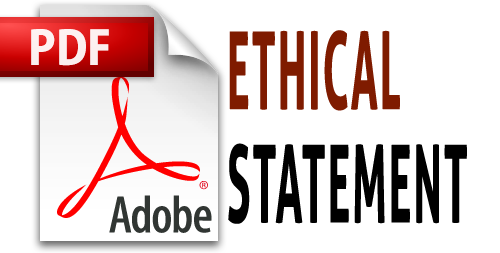PEMANFAATAN APLIKASI WHATSAPP PADA PEMBELAJARAN BERBASIS MASALAH UNTUK MATA KULIAH AKUNTANSI INTERNASIONAL DI UNIVERSITAS PGRI MADIUN
 Supri Wahyudi Utomo(1*),
Moh. Ubaidillah(2)
Supri Wahyudi Utomo(1*),
Moh. Ubaidillah(2)
(1) Universitas PGRI Madiun
(2) Universitas PGRI Madiun
(*) Corresponding Author
 Abstract viewed : 5304
|
Abstract viewed : 5304
|  PDF downloaded : 913
PDF downloaded : 913
Abstract
The selection of learning methods becomes essential in teaching and learning process to improve student’s learning outcomes. The fault in choosing a learning method, will negatively affect the student’s learning outcomes. In addition to learning methods, learning media must be considered to support and facilitate learning to achieve the learning objectives. This study aims to identify the impacts of problem-based learning models on student learning outcomes by using Whatsapp applications. The research types was ex-post facto quantitative using quota sampling method, which determined as many as 32 7B semester students of the Accounting Education Program at the University of PGRI Madiun. The data collection technique was observation by applying questionnaires, and document of student learning outcomes. The method of analyzing questionnaire data in this study used the structural equation modeling (SEM) with partial least squares (PLS) tool. The results showed that problem-based learning model with Whatsapp application positively affected the students’ achievement for the International Accounting Subject. The students’ achievement was above the threshold level. Students could easily communicate, coordinate and discuss materials before presentation without direct interaction.
ABSTRAK
Pemilihan metode pembelajaran merupakan hal penting dalam proses belajar-mengajar untuk meningkatkan hasil belajar mahasiswa. Sebaliknya, kesalahan memilih metode pembelajaran akan berdampak negatif terhadap hasil belajar mahasiswa. Selain metode pembelajaran, pemanfaatan media pembelajaran juga harus diperhatikan untuk mendukung dan memudahkan pembelajaran sehingga tujuan belajar dapat tercapai. Penelitian ini bertujuan untuk mengetahui pengaruh atau dampak penerapan model pembelajaran berbasis masalah yang memanfaatkan aplikasi Whatsapp terhadap hasil belajar mahasiswa. Jenis penelitian ini adalah penelitian kuntitatif ex-post facto. Pengambilan sampel menggunakan metode quota sampling sebanyak 32 mahasiswa semester 7B program studi pendidikan akuntansi Universitas PGRI Madiun. Teknik pengumpulan data menggunakan kuesioner dan tes hasil belajar mahasiswa. Teknik analisis data kuesioner menggunakan structural equation modeling (SEM) dengan alat partial least squares (PLS). Hasil penelitian menunjukkan bahwa penerapan model pembelajaran berbasis masalah dengan menggunakan aplikasi Whatsapp berpengaruh atau berdampak positif yang ditunjukkan hasil belajar mahasiswa untuk mata kuliah Akuntansi Internasional berada di atas kriteria capaian yang ditetapkan. Mahasiswa lebih mudah dalam komunikasi, koordinasi, dan diskusi sebelum melakukan presentasi tanpa harus bertemu secara langsung.
Keywords
References
Aji, H. S. 2018. Pengembangan Aplikasi Layanan Pesan Instan Whatsapp Sebagai Sumber Belajar Mandiri Untuk Meningkatkan Motivasi Dan Hasil Belajar Fisika Materi Pokok Efek Rumah Kaca Peserta Didik Kelas XI SMAN 1 Purwokerto, Skripsi. Program Studi Pendidikan Fisika, Fakultas Matematika dan Ilmu Pengetahuan Alam, Universitas Negeri Yogyakarta.
Amir, M. T. 2009. Inovasi Pendidikan Melalui Problem Based learning. Jakarta: Kencana Prenada Media Group.
Aka, E. G., Güven, E., & Aydoğdu, M. 2010. Effect of Problem Solving Method on Science Process Skills and Academic Achievement. Journal of Turkish Science Education. Volume 7, Issue 4. Hal 13-25.
Arends, R. I. 2012. Learning to Teach. Ninth Edition. New York: The Mc Grow Hill Companies.
Ari, A. A. & Katranci, Y. 2014. The Opinion of primary Mathematics Student-Teachers on Problem-Based Learning method. Procedia Social and Behavioral Science. Elsevier Science Direct. Vol. 116. Hal. 1826-1831.
Catanach, A. H., & Fieldmann, D. 2010. Advances in Accounting Education: Teaching and Curriculum Innovations. Bingley: Emerald Group Publishing Limited.
Erdogan, T., & Senemoglu, N. 2013. Problem-Based Learning in Teacher Education: Its Promises and Challenges. Procedia-Social and Behavioral Sciences. Elsevier Science Direct. Vol. 116. Hal. 459-463.
Hamalik, O. 2014. Proses Belajar Mengajar. Bandung: Bumi Aksara.
Hamruni. 2011. Strategi Pembelajaran. Yogyakarta: Insan Madani.
Jalani, N.H., & Sern, L.C. 2015. Efficiency Comparisons between Example-Problem-Based Learning and Teacher-Centered Learning in the Teaching of Circuit Theory. Procedia - Social and Behavioral Sciences. Elsevier Science Direct. Vol. 204. Hal. 153 – 163.
Manaf, N. A. A., Ishak, Z., & Wan Hussin, W. N. 2011. Application of Problem Based Learning (PBL) in a Course on Financial Accounting Principles. Malaysian Journal of Learning & Instruction mjli. Universitas Utara Malaysia. Vol. 8, Hal.21-47.
Marsnik, S. J., & Thompson, D. B. 2013. Using Contract Negotiation Exercises to Develod Higher Order Thingking and Strategic Business Skills. Journal of Legal Studies Education.Vol. 2.(2013) hal. 201-248.
Moutinho, S., Torres, J., Fernandes, I., & Vasconcelos, C. 2015. Problem-Based Learning And Nature Of Science: A Study With Science Teachers. Procedia-Social and Behavioral Sciences. Vol. 191,(2015). hal. 1871-1875.
Phumeechanya, N. & Wannapiroon, P. 2014. Design of problem-based with scaffolding learning activities in ubiquitous learning environment to develop problem-solving skills. Procedia - Social and Behavioral Sciences. Vol. 116 (2014). hal. 4803-4808.
Rohmadi, A. 2016. Tips Produktif Ber-sosial Media. Jakarta: Gramedia.
Rusman. 2011. Model-Model Pembel-ajaran Mengembangkan Profesionalisme Guru. Jakarta: Raja Grafindo Persada.
Sanjaya, W. 2011. Strategi Pembelajaran Berorientasi Standar Proses Pendidikan. Jakarta: Kencana Prenada Media Group.
Siburian, J. 2010. Model Pembelajaran Sains, Jambi: Universitas Jambi.
Syed Hassan, S.A.H., Yusof, K.M., Mohammad. S., Abu, M.S., & Tasir, Z. 2012. Methods to Study Enhancement of Problem Solving Skills in Engineering Students through Cooperative Problem-Based Learning. Procedia - Social and Behavioral Sciences. Vol. 56 (2012). hal. 73-746.
Tatar, E. & Oktay, M. 2011. The Effectiveness of Problem-Based Learning on Teaching The First Law of Thermodynamics. Research in Science & Technological Education Aquatic Insects. Vol. 29, No. 3 hal. 315-332.
Taúglu, A.K., & Bakaç, M. 2010. The Effects of Problem Based Learning and Traditional Teaching Methods on Students’ Academic Achieve-ments, Conceptual Developments and Scientific Process Skills According to Their Graduated High School Types. Procedia Social and Behavioral Sciences. Vol. 2 (2010). hal. 2409–2413.
Ünal, C. & Özdemir, O. F. 2013. A Physics Laboratory Course Designed Using Problem-Based Learning for Prospective Physics Teachers. European Journal of Science and Mathematics Education Vol. 1, No. 1. hal. 29-33.
Yew, E.H.J. & Goh, K. 2016. Problem-Based Learning: An Overview of its Process and Impact on Learning. Health Professionals Education Vol. 2, No. 9, hal. 75-79.
Refbacks
- There are currently no refbacks.
Copyright (c) 2018 Supri Wahyudi Utomo, Moh. Ubaidillah

This work is licensed under a Creative Commons Attribution-NonCommercial 4.0 International License.
Kwangsan Indexed By
Kwangsan: Jurnal Teknologi Pendidikan diterbitkan oleh Balai Besar Guru Penggerak (BBGP) Prov. Jawa Timur.
Kementerian Pendidikan dan Kebudayaan
Alamat Redaksi:
Jl. Mangkurejo, Ds. Kwangsan, Sedati - Sidoarjo.
Telp 0318911373 Fax. 0318911392
Email: jurnal.kwangsan@kemdikbud.go.id & jurnalkwangsan@dikbud.belajar.id






























